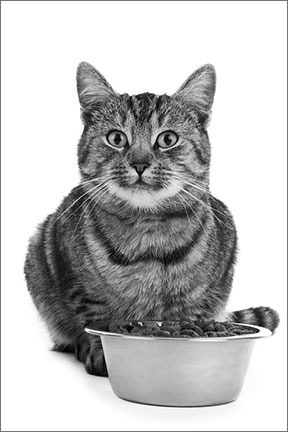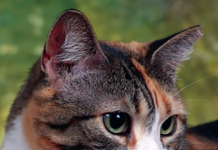Veterinary nutritionist Joseph J. Wakshlag, DVM, Ph.D., has an eye-opening assessment about finicky eaters:

288
“The reality is that most finicky cats are the best kinds to have because they regulate themselves. They eat to meet a requirement to keep themselves alive, not for pleasure. They are lean animals and usually live longer.”
Some cats are born finicky about food. “Hormones control part of this. There are appetite centers in your brain, and they control your hunger patterns — what and how often you eat,” says Dr. Wakshlag, Associate Professor at the Cornell University College of Veterinary Medicine. “It’s part of the reason some people like to eat and become overweight and others don’t. Since all other species where this has been examined show the same patterns of similar appetite centers, and also because they have the same rates of obesity as people, we assume the physiology is similar.”
Q: What are other causes of inappetence?
A: If a cat is on medication, this can sometimes be the cause. If he’s not on medication and becomes inappetent, then you know there is probably disease. Inappetence is a clinical sign of kidney disease, liver failure and infection. Pain can cause it. Dental disease and some forms of pain in the mouth can cause it, although that’s more so for cats than dogs. Dogs can usually muscle through dental disease.
Q: Is there a difference between inappetence and anorexia?
A: Inappetence is more of a lay term, whereas anorexia and hyporexia — a diminished appetite rather than a loss of it — are scientific terms.
Q: Which medications tend to cause inappetence?
A: Opioids like morphine decrease the motility of the gastrointestinal system and can cause it. Many chemotherapeutic drugs will cause nausea, which causes a lack of appetite. It’s generally not a problem if a cat is on a week’s worth of antibiotics, but chemotherapy is a problem. If your pet is on medication for allergies, it can change the appetite: Prednisone usually increases it, while cyclosporine tends to decrease appetite.
Q: When does inappetence warrant a veterinary visit?
A: After two days or two to three meals. When cats don’t eat, they are probably sick. Usually a mouth check is the most important examination, and the veterinarian will look for such things as an ulcer on the tongue, loose teeth or a tumor in the mouth.
Q: What are the cautions when trying to get your cat to eat?
A: You have to be careful of adverse reactions. If I give a chemo drug, the result is you’re nauseous. Here’s your food, which you won’t eat because you are nauseous, and now you are averse to that particular food. Change the food to a different form, and you’ll know if the cat is not eating because he’s averse to it or if he is still nauseated. Try new pet food, and if new food doesn’t work, then we go to human food. But we have to be aware that if the cat is nauseous, and we force food on him, then he will just end up becoming averse to many different foods, so stopping the nausea is the most important thing.
Q: How do you make food more palatable?
A: Use chicken, broth, cheese. You can also try jack mackerel. Cats like salt, protein and fat. Like people, every animal has different preferences.
Q: What are long-term solutions?
A: Some solutions are to provide energy-dense food, food with a higher calorie and fat content than you would normally use. These are more palatable. Heating food can make a bit of difference for cats.
When necessary, cats can be given their nutrition through feeding tubes. These tubes must be placed while the cat is under general anesthesia.
Q: Can inappetence cause other problems?
A: Anorexia is a problem since cats can use fat for fuel, but when a cat starts mobilizing fat stores — the fat on the body — for energy, the liver has a hard time keeping up, and the fat can accumulate in the liver causing hepatic lipidosis, often called “fatty liver,” which causes liver failure. The fatter the cat is before weight loss begins, the bigger the problem.
However, if it’s caught early, hepatic lipidosis can be treated. Developing hepatic lipidosis takes about a week of complete anorexia, and if a cat is eating less than half of his normal food volume, it might take a bit longer to happen. Unexpected or unexplained weight loss is a bad sign, and your cat should go to the vet when you notice it. ❖



